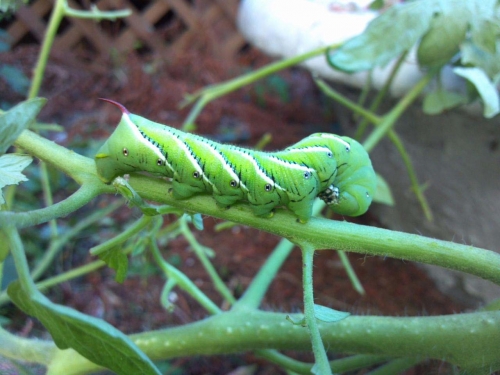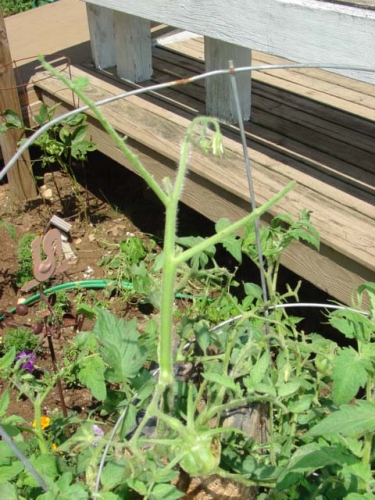Hornworms: Are they eating my tomatoes?
Defoliated tomato plants can indicate insect activity. Commonly these are the work of tomato hornworms.
 We’ve finally gotten some rain and drought relief in Michigan, encouraging our vegetable gardens to mature. But what should you do when you go out and find that something is eating the leaves from your tomatoes and leaving dark pellets behind? This is a giveaway that you have a tomato hornworm present. Their coloring enables them to blend in with the tomato plant so well that even though they are quite large for a caterpillar, they can be difficult to find.
We’ve finally gotten some rain and drought relief in Michigan, encouraging our vegetable gardens to mature. But what should you do when you go out and find that something is eating the leaves from your tomatoes and leaving dark pellets behind? This is a giveaway that you have a tomato hornworm present. Their coloring enables them to blend in with the tomato plant so well that even though they are quite large for a caterpillar, they can be difficult to find.
The easiest way to find where the hornworm is hiding is to look for the frass or balls of dark excrement below where they are hanging or feeding. There are many species of hornworms that live in Michigan and can be found feeding on other garden vegetables such as egg plants. Hornworms are the caterpillar stage of sphinx or hawk moths. These are also popularly known as “hummingbird moths” because they hover while feeding resembling hummingbird behavior.
It is easy to tell if you have a tomato hornworm because they can defoliate a tomato plant very quickly. They will even feed on the fruits. There are two types of hornworm that can be found on tomatoes; the tomato hornworm (Manduca quinquemaculata) and the tobacco hornworm (Manduca sexta). They look very similar and sometimes are both found on the same plant. The tomato hornworm has a dark green horn with white arrows black spots on its sides and the tobacco hornworm has white diagonal lines a red horn.

Mysterious and obvious defoliation indicates a tomato hornworm is present.
Tomato hornworms are easily controlled with insecticides or BT. However it is just as easy to hand pick them once you find where they are hiding. They tend to feed in the morning and late afternoon and can be easier to find during these times. Looking for the eggs on the underside of the leaves in late spring is the first defense against these pests. Regular monitoring is the next best. If you had unmanaged hornworms the previous year, the pupae overwinter in the soil ready for the next spring. Rotating your crops in your garden can also help to control these pests.
Other common insects that may be found feeding on tomato plants are tomato fruit worms, army worms, yellow striped armyworm, cutworms, flea beetles, aphids, spider mites and potato leafhoppers. Careful and regular inspection of your garden plants can offer the opportunity for early detection of pests offering management opportunities before serious crop damage occurs.
For more information about gardening in Michigan visit the Gardening in Michigan website.



 Print
Print Email
Email


